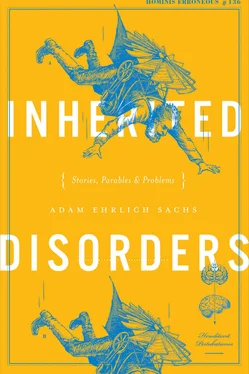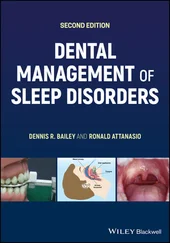It is possible but not very interesting to trace the son’s subsequent decline. In his journals, he attributes it to consciousness (“a psychological disease”) and the contraption (“an aeronautical disease.”) Consciousness, he writes, “works too well,” while the flying contraption “does not work at all,” but both of them “defy Nature.” If only “the contraption worked as well as consciousness does, and consciousness worked as well as the contraption!” He was not really much of a philosopher, and in fact the father’s flying contraption is now of more historical interest than the son’s journals, which he privately dared to hope would lift him into the philosophical firmament. In any case, on an autumn night in 1898, he took the contraption off its hook (with the feeling, as he recorded in his final journal entry, that “this is what my father intended for me to do all along, to disobey my mother, to fly his contraption”) and carried it to the very cliff where his father had died thirty years earlier. A butcher up at dawn to dismantle a pig happened to witness the son’s flight. Apparently, before the contraption fell to earth, it generated a fair amount of lift. We cannot know if, for those few moments, as the pinwheel whirled and his father’s contraption climbed through the air, the son reconsidered everything he thought he knew.
…………………….
One Czech modernist whose vast, loquacious, multifarious novels reached the end point of profusion in literature had a son who, upon realizing that his father had exhausted the possibilities of profusion, went to the other extreme, joining a Benedictine monastery in Orlová, near the Polish border, and exploring thereafter the possibilities of silence . Prior to taking his vow of chastity, however, he produced a son of his own, who upon his own self-described artistic awakening saw straight away that the only option remaining was a life of radically uncompromising normalcy , normalcy taken to the point of absurdity . He behaved normally, to the extreme, he spoke normally (to the point of absurdity), he lived in an apartment complex so rigorously normal in every dimension that it could legitimately be considered deranged, a deranged complex, on a street that was in some ways psychotically archetypal, he married a woman whom he called “the median woman of Prague,” and in this meticulously normal context he wrote — in contradistinction to his loquacious modernist grandfather and his silent monkish father — scrupulously normal books, with normal syntax, of normal length, on the most normal themes, thus pioneering and single-handedly exhausting a literature of normalcy, of the most stringent normalcy, a normalcy of great severity. His only departure, really, from a life of categorical normalcy was his refusal to give his wife the child for which she yearned, on the grounds that, after him, there would be no viable artistic strategies left for the little one; his was the last generation with a viable artistic strategy, as he explained.
…………………….
A man accused of sending rat-poison-coated razor blades to the biographers of his father, a recently deceased public figure, told the judge that he objected not to the content of the biographies but to their tone. The first biography, he said, was weirdly hostile, the second weirdly adulatory, and the third weirdly neutral. All three biographers received rat-poison-coated razor blades. When the judge asked whether he could imagine a biography of his father that would not warrant a rat-poison-coated razor blade, the man replied excitedly that he had actually had a dream the previous night that he had finished reading a new biography of his father and sent the author, instead of a razor blade coated on both sides with rat poison, a bouquet of flowers. But when he woke up he could not remember what the tone of this dream-biography had been.
…………………….
A brilliant geneticist who’d played a pivotal role in decoding the human genome was devastated when his only son, who had always, according to teachers, had “difficulty socializing” due to his “obsessive behavior” and his “periodic violent outbursts,” was diagnosed with a rare psychiatric disorder. Pointing to the likelihood of future violent outbursts, his doctors strongly advised that the son be institutionalized, and the geneticist’s wife, who lived in constant fear of these intermittent but always extremely violent outbursts, agreed with them.
The geneticist, however, flatly refused. It seems he had become fixated on the question of whether it was he or his wife who was genetically responsible for their son’s troubled mind. Over the next decade, during which he and his wife were terrorized more and more frequently by their son’s periodic outbursts, despite the antipsychotic drugs he was prescribed, the geneticist renounced all other scientific pursuits and even relinquished the directorship of his beloved institute in order to study his son’s mind and genome, in comparison to his wife’s and his own.
Again and again the wife begged him to have their son committed. But again and again the geneticist issued his refusal, typically by screaming the word no . He needed to determine, he said, whether it was he or she who was culpable for their son’s troubled mind.
Finally, on a trip to Florence, standing in a long line to see Michelangelo’s David , the son had an especially violent outburst and stabbed his mother in the heart with a ballpoint pen he had snatched from the hotel lobby. She died, and he was institutionalized at last.
For the geneticist, this was not only a horrifying personal tragedy but a profound scientific setback : in one fell swoop, he lost access to both his wife’s mind and his son’s mind. (He had, thankfully, complete copies of their genomes.) For a decade, he more or less disappeared. Neighbors reported loud sounds coming sporadically from his house. Twice the police came by to speak with him because he’d erupted, twice, at a neighbor’s cat whom he accused — both times — of coming onto his lawn and looking at him through his windows. In civil moods, he explained to neighbors his “working hypothesis” that his son had inherited the mental disorder from the maternal side.
But just this year he reappeared at a conference at Cornell and triumphantly proclaimed that he’d isolated the gene that caused this rare psychiatric disorder. His son, he said, pointing at his own head somewhat insistently, had actually inherited it from the paternal side.
Two scientists I sat between at a dinner party last week told me that the geneticist will probably receive next year’s Nobel Prize in Physiology or Medicine for his work on the patrilineal inheritance of the disorder.
…………………….
The son of H. Philip Waldfogel — the chairman, under Ford, of the Federal Reserve, who had once had to decide between expanding the money supply, thereby reducing unemployment but raising inflation, and contracting the money supply, thereby reducing inflation but raising unemployment — can no longer bear to watch his father try to decide between the two desserts offered every evening at his Virginia nursing home. The choice is between cheesecake and mixed berry crumble. The son has requested that on evenings he visits, his father just be given the berry crumble, unless he explicitly asks for the cheesecake.
…………………….
The heir to a huge food and beverage fortune, whose father, while he was alive, never gave one penny to charity, has announced that he will donate all of his father’s assets to public health research on three terrible parasites. A third of his father’s assets, said his press release, will go to research on “worms that enter the human body through the soles of the feet,” a third will go to research on “worms that enter the human body through the whites of the eyes,” and a third will go to research on “worms that enter the human body through the webbing of the fingers.”
Читать дальше












